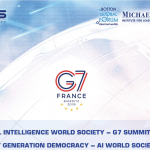August 18, 2020
Social Contract for the AI Age
09/09/2020
Original Signatories
Governor Michael Dukakis, Boston Global Forum and President Vaira Vīķe-Freiberga, Latvia and World Leadership Alliance-Club de Madrid
Additional Signatories
Vint Cerf, Father of Internet, Google, Nazli Choucri, MIT,
Prime Minister Zlatko Lagumdzija, Bosnia and Herzegovina,
Tuan Anh Nguyen, Boston Global Forum, Thomas Patterson, Harvard University,
Alex Pentland, MIT, Marc Rotenberg, CAIDP, David Silbersweig, Harvard University
I. A New Social Contract in the Age of Artificial Intelligence
The term “artificial intelligence” refers to the development of computer systems able to perform tasks that normally require human intelligence, such as visual perception, speech recognition, decision-making, language translation, and self-driving cars. Advances in AI have already altered conventional ways of seeing the world around us. This is creating new realities for everyone – as well as new possibilities.
These advances in AI are powerful in many ways. They have created a new global ecology and yet remain opaque and need to be better understood. Advances in AI raise policy issues that must be assessed. We must now focus through dialogue, tolerance, learning and understanding on key principles and practices for an agreement among members of society for shared social benefit that we call the Social Contract for the AI Age.
The expansion of Artificial Intelligence is widely recognized and could change our lives in ways yet unimagined. At the same time, without guidelines or directives, the undisciplined use of AI poses risks to the wellbeing of individuals and creates possibilities for economic, political, social, and criminal exploitation.
The international community recognizes the challenges and opportunities, as well as the problems and perils, of AI. Many countries have announced national strategies to promote the proper use and development of AI. These strategies set out common goals such as:
• Scientific research, funding and culture,
• Sustainable development, and inclusive growth
• Skills, education, and talent development
• Public and private sector adoption,
• Fairness, transparency, and accountability
• Ethics, values and inclusion,
• Reliability, security and privacy,
• Science-policy links,
• Standards, human control and regulations
• Data and digital infrastructure.
AI is also the focus of foreign policy and international cooperation. There is a shared view that no country will be able to compete or meet the needs of its citizens without increasing its AI capacity. As well, many countries are now engaged in technology leapfrogging. It is no longer expected, nor necessary, to replicate the stages of economic development of the West—one phase at a time.
In a world as diverse as the one today, there are few mechanisms for responding to such possibilities on a global scale. Social Contract for the AI Age is designed to establish a common understanding for policy and practices, anchored in general principles to help maximise the “good” and minimise the “bad” associated with AI. Derived from the 18th century concept of a social contract—an agreement among the members of society to cooperate for social benefits—Social Contract for the AI Age is focuses on the conditions of the 21st century. It is a response to artificial intelligence, big data, the Internet of Things, and high-speed computation.
Foundations
Just as earlier social contracts helped shape societies for a common purpose, the Social Contract for the AI Age has a transformative vision, one that transcends the technological features of artificial intelligence and seeks to provide foundations for a new society. Consider, for example, how the Covid-19 pandemic urgently requires a new society with new structure and order, approach — new ways to share data and coordinate action, accelerated social reliance on digital service across businesses, education, and government services. The Social Contract for the AI Age would create standards for a new international system. It focuses on the conduct of each nation, relations with international business and not for profit entities, and the cooperation of nations. Just as TCP / IP is the platform for communication among internet users, the Social Contract for AI Age is a platform for connection among governments, stakeholders, and private and public institutions.
Objectives
The Social Contract for the AI Age seeks to build a multi-stakeholder, inclusive society in all aspects of life across politics, government, economics, business, and industry. The Social Contract for the AI Age values creation, innovation, philanthropy, and mutual respect. It seeks the right of freedom on, and access to, the Internet worldwide. The Social Contract for the AI Age seeks to make the world a locus of responsible interaction—a place where every person’s contribution is recognized and everyone has a right to knowledge and access to information, where no one is above the law, where money cannot be used to subvert political process, and where integrity, knowledge, creativity, honesty, and tolerance shape decisions and guide policy.
In short, the Social Contract for the AI Age seeks to build a world where all are recognized and valued, and all forms of governance adhere to a set of values and are accountable and transparent. It is a world where global challenges are met by collective action and responsibility.
Download and read the full Report here






